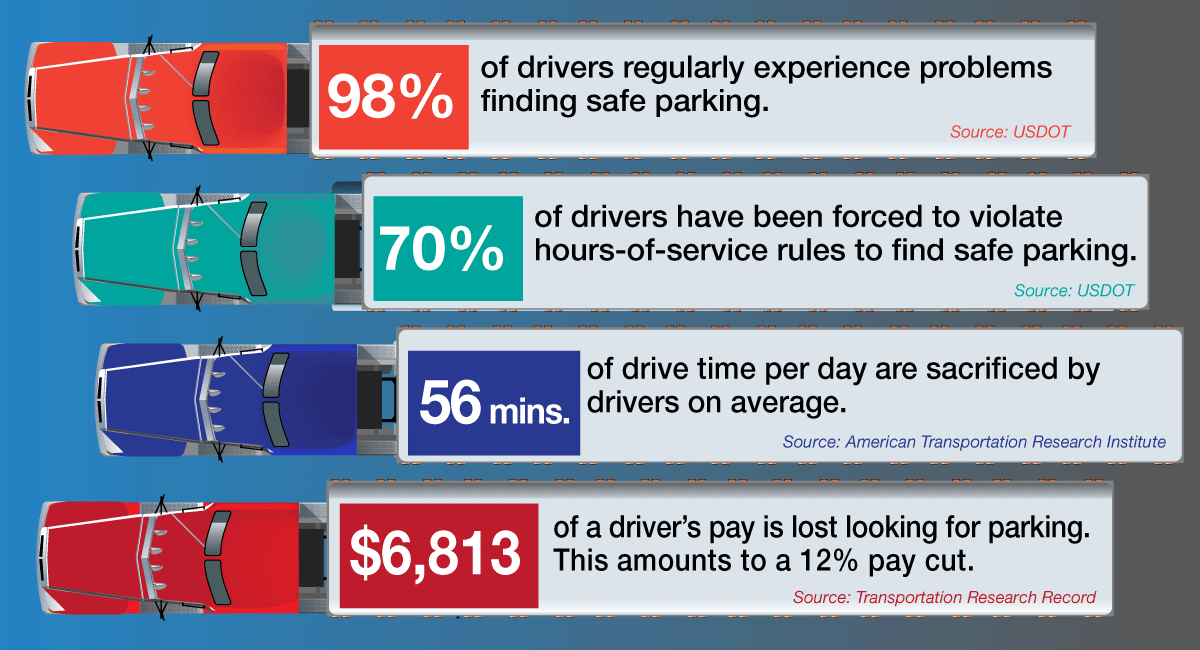
America's Truck Parking Crisis
Identifying the Problem
A chronic, nationwide lack of truck parking is forcing America’s professional truck drivers into an untenable position—either violate federal hours-of-service regulations that mandate rest breaks at specific times, or park in unsafe and unauthorized locations.
This dire shortage of truck parking has a detrimental impact on drivers’ quality of life, roadway safety, and our supply chain.

Highlighting the Issue
Increasing the supply of truck parking is one of ATA’s highest priorities. We have repeatedly raised this issue directly with Members of Congress through our Call on Washington program and congressional hearings. We have also had in-depth discussions with the Secretary of Transportation and Department of Transportation staff.
In November 2023, Iowa Motor Truck Association President Brenda Neville testified on behalf of ATA at a Senate Transportation and Infrastructure Subcommittee hearing on highway safety.
After explaining the problem in detail and describing its impact on all drivers and the overall industry, Neville shared her perspective as a co-chair of the Women In Motion Advisory Council. Neville told lawmakers that the parking shortage is particularly hard on female drivers, who cite it as a major barrier to more women joining and staying in the industry. Additionally, Neville emphasized the serious public safety hazard of 18-wheelers being forced to park on highway offramps, side streets, and the shoulder of rest areas. This point has been echoed by numerous law enforcement organizations.

The ATA is appreciative of the Department of Transportation’s responsiveness to the concerns raised by the trucking industry and the agency’s commitment to addressing the dearth of parking. In September 2022, U.S. Transportation Secretary Pete Buttigieg sent a letter to ATA President and CEO Chris Spear pledging the Administration’s support for increasing the availability of safe parking options for America’s professional truck drivers through its Trucking Action Plan, grant funding under the Bipartisan Infrastructure Law, and increased coordination with state departments of transportation and the trucking industry.
Finding the Solution
Thanks to ATA’s persistent advocacy and our champions in Congress and in the Executive Branch, we are finally beginning to see results.
The Truck Parking Safety Improvement Act—introduced by U.S. Senators Cynthia Lummis (R-Wyoming) and Mark Kelly (D-Arizona) and U.S. Representatives Mike Bost (R-Illinois) and Angie Craig (D-Minnesota)—would create a $755 million federal grant program dedicated to truck parking expansion.
ATA is also pressing states and the federal government to invest in truck parking using existing funding streams, such as the Bipartisan Infrastructure Law. As a result, hundreds of new truck parking spaces are being developed nationwide.
In September 2023, Spear and Buttigieg visited South Dakota, where they celebrated a new federal investment to expand truck parking capacity. The new truck parking spaces, funded by the Bipartisan Infrastructure Law, will be built along Interstate 90 in Salem and will help to meet the critical need to improve truck driver safety and increase the efficiency of the nation’s supply chain.
In order to sustain this encouraging momentum, ATA sent a letter in November 2023 calling on all 50 state governors to make room for truck parking in their infrastructure spending priorities. The letter spelled out the numerous new resources provided by the federal government, including new funds from the Bipartisan Infrastructure Law, to improve and expand truck parking facilities.
We’re just getting started. The truck parking shortage is a major impediment to our economy, and it puts all road users at risk. When truck drivers have reached the end of their hours of service, they deserve a convenient and safe place to park. We will continue to push policymakers to prioritize truck parking projects until they do.
Additional Reading
- Managing Critical Truck Parking Case Study: Real World Insights From Truck Parking Diaries, American Transportation Research Institute, December 2016.
- Jason’s Law Commercial Motor Vehicle Parking Survey and Comparative Assessment, U.S. Department of Transportation, December 2020
- A Comparative Analysis of Truck Parking Travel Diary Data, Transportation Research Record, Vol. 2672(9), 2018